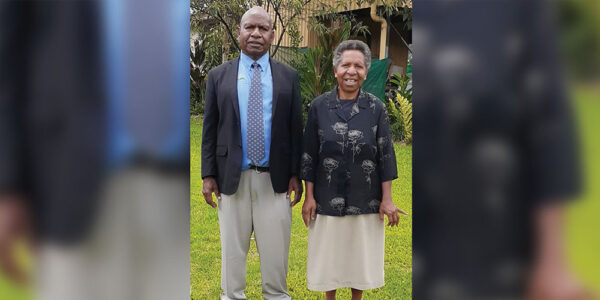With a passion for improving the welfare of women and their families in Papua New Guinea (PNG), Leighton Kasimo has repaired and helped distribute more than 1,600 sewing machines since 2014 to upskill and empower women in need.
“I noticed a great need for women and families, so I discussed with my wife and decided to assist with necessary skills. We have to address social issues affecting families,” he said.
Being in pastoral ministry since 2008 and ordained in 2012, Kasimo currently serves the church as stewardship and family ministries director for the Western Highlands Mission (WHM). It wasn’t until Brian O’Hare from Perth, Australia, taught Kasimo to repair sewing machines in 2014 that he made it a focus of his ministry.
“James Ua introduced Brian to us at Kimininga Mission headquarters, and that is where I grabbed the opportunity as a hobby, but it has turned into a ministry to meet the needs of others,” he explained.
Lacking the finances to buy sewing machines for the women themselves, Kasimo and his wife, Ato, with whom he partners in ministry, rely on the Adventist Development and Relief Agency (ADRA) and people from Australia and overseas to support and sustain their work.
In one instance, WHM stewardship and health director Anita Kup requested funding from ADRA in 2018, which the Kasimos used to provide 23 manual sewing machines to women in need and conduct training in how to use them.
Kasimo continued, “God has blessed my family and me abundantly to become blessings to many families who are struggling to live above the poverty line, by repairing their sewing machines and also imparting other skills to them so they can earn income to sustain their lives, like putting food on the table and paying school fees for their children.”
In addition to sewing classes, the Kasimos also train women in draping, flower arranging, tailoring, music sight-reading, financial literacy, sewing machine repair, nutrition, and healthy living.
“[My wife] is gifted in draping, flower arranging, and tailoring, and therefore as partners in ministry, we are a witness to others that Jesus loves and cares for them,” he said.
Kasimo organizes his sewing machine ministry around trips to districts and other appointments during the year.
“I follow my yearly planner and go to the districts with my wife and other facilitators to conduct the training. There I also conduct evangelistic meetings, workshops on stewardship, and family ministries and visit churches or women’s groups upon request, apart from my departmental duties,” he explained.
When asked why he is so determined to improve the lives of women in this way, Kasimo replied, “Women play an important role in managing family affairs. Women are [often] seen as second class [yet] must become breadwinners for their families. I want to help those who are unfortunate through domestic violence and abuse.”
Besides donations of funds and sewing machines, Kasimo said, other items are needed to continue his ministry, including a high-quality camera to capture photos and videos for Adventist Record and other news outlets. He also needs a used vehicle so that the team can travel to the more remote districts to conduct training; fabrics appropriate for sewing clothing; and a generator for electricity in remote places. Kasimo also mentioned French curve rulers in different sizes for pattern design and cutting and a tent for the team when they conduct training in remote areas.
“I am convinced that God has blessed my wife and me with many skills and motivated us to share what we have with others to improve their living standards. Women are good managers of homes; therefore, equipping them with skills means a lot in nation-building,” he said.
The original version of this story was posted by Adventist Record.



